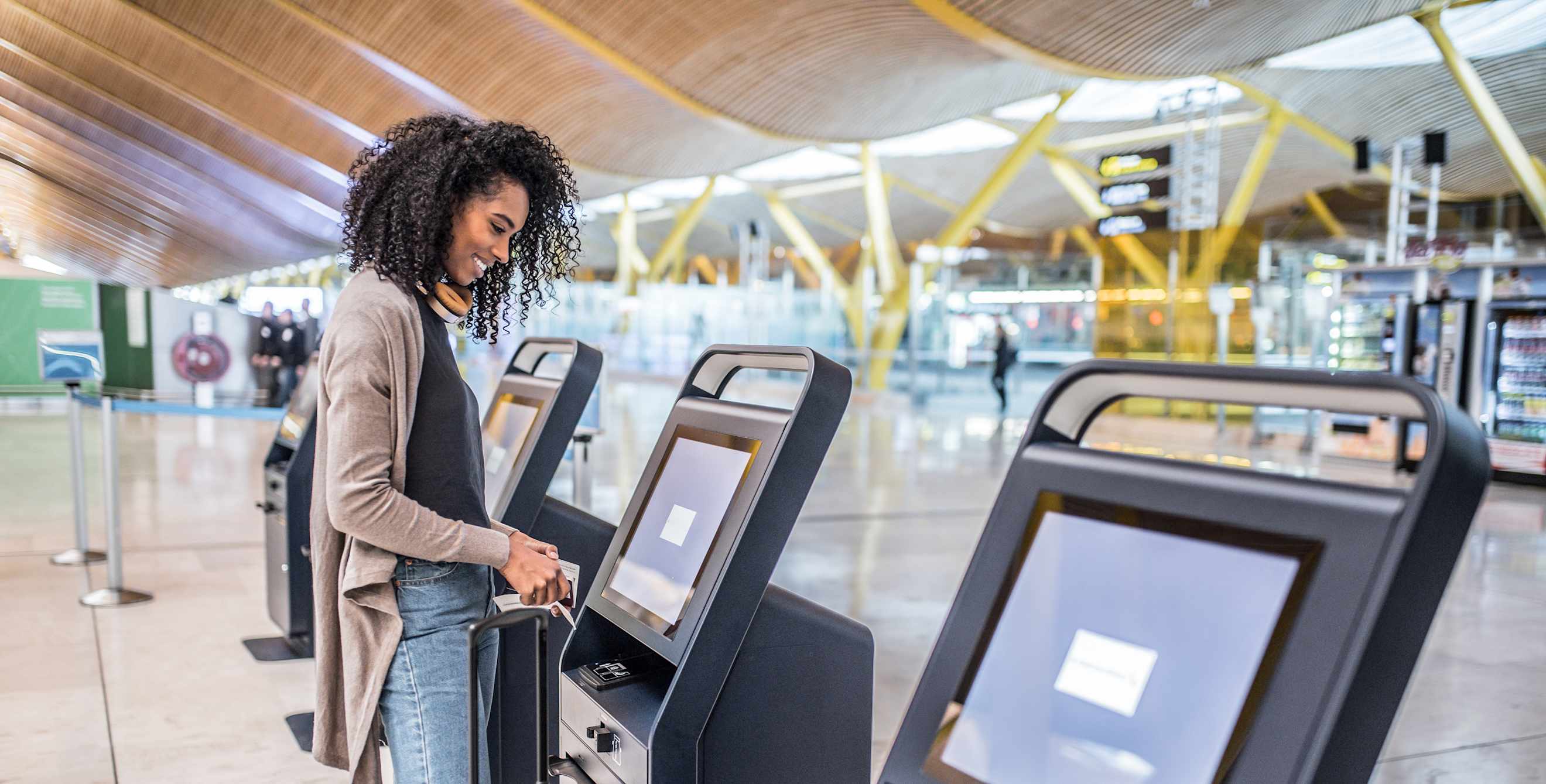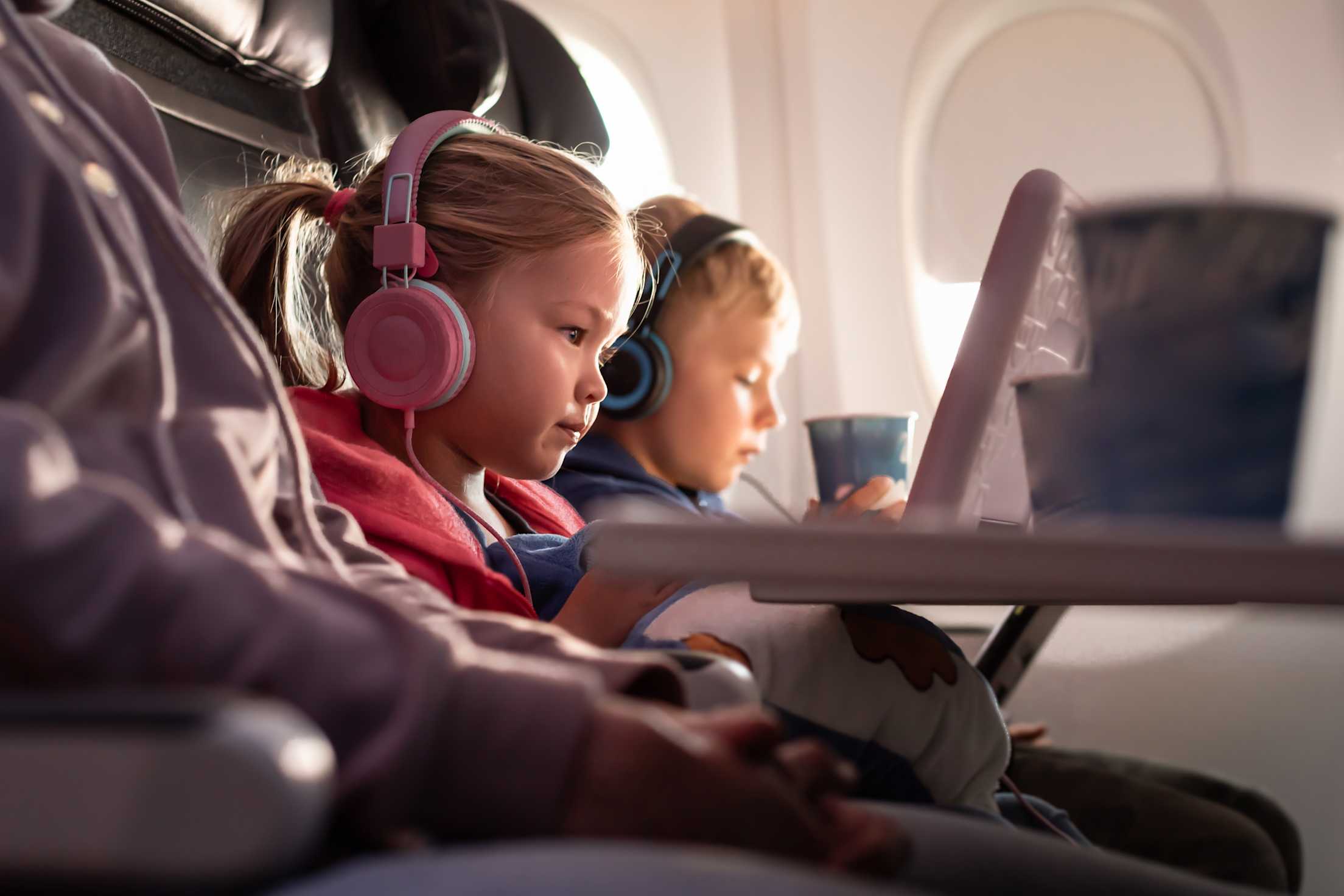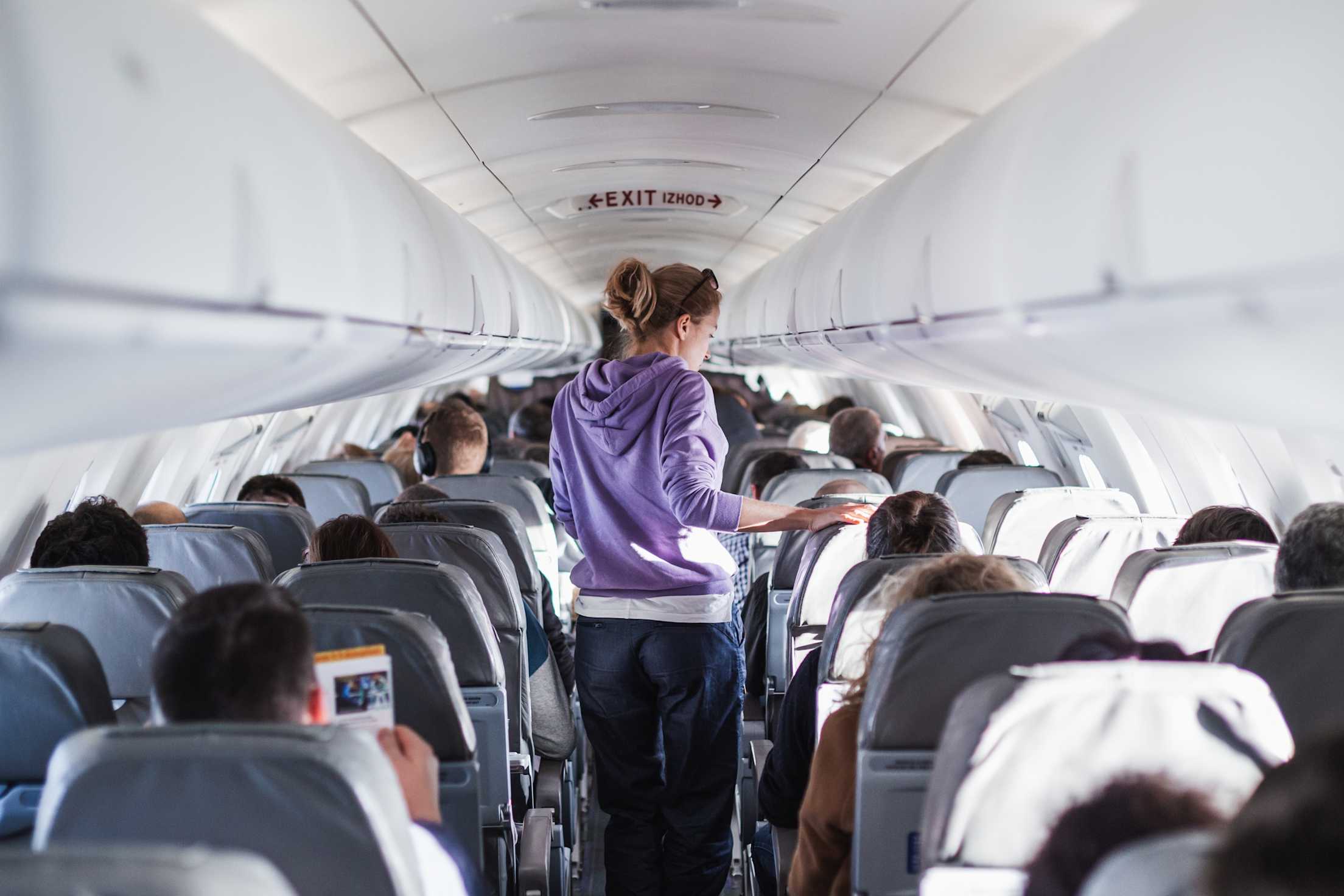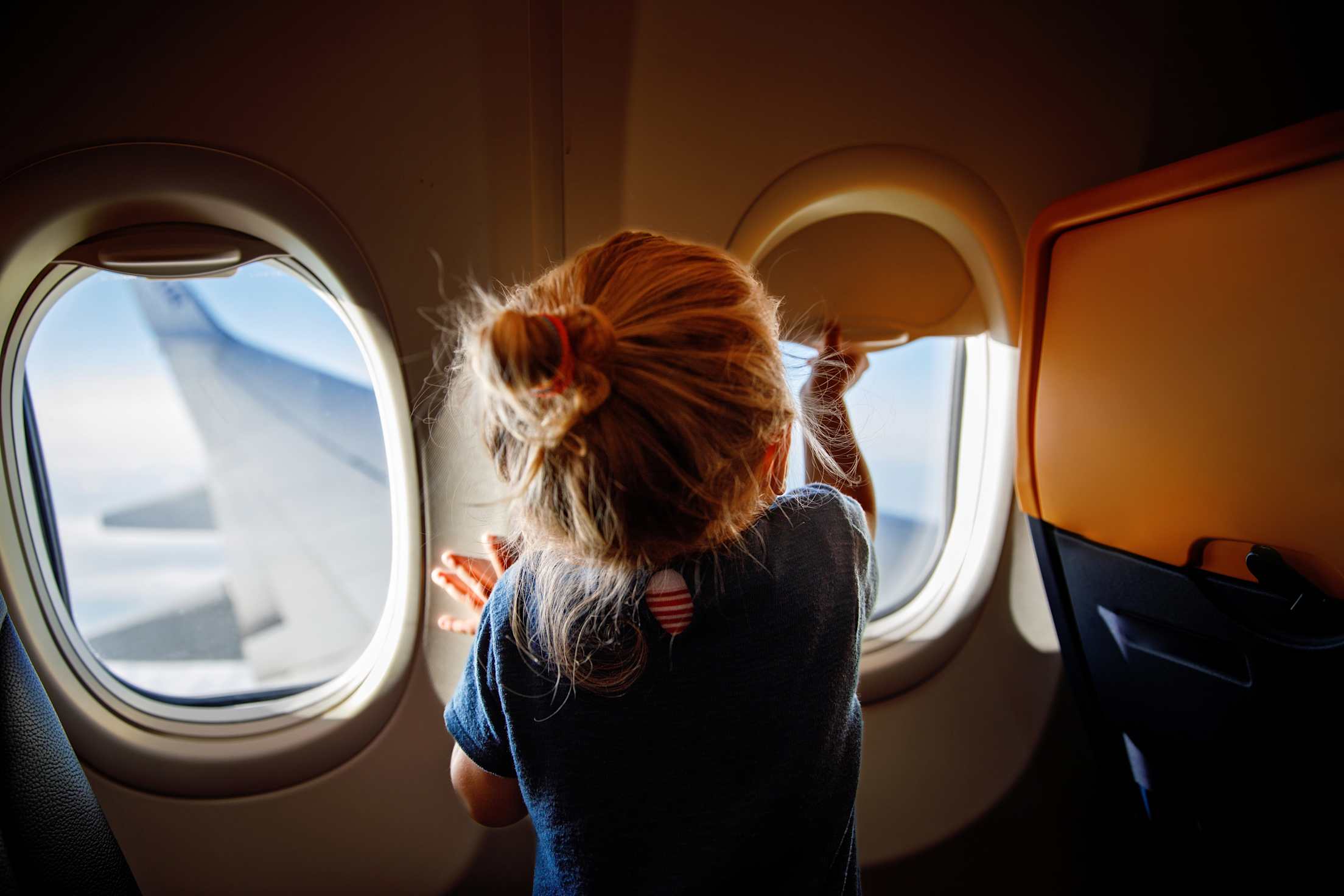
11 Etiquette Tips for a More Pleasant Flight
From the rules of reclining to graciously handling screaming kids, here’s how to be a considerate passenger.

These days, record numbers of travelers are streaming through airports, cabin space is shrinking, and air rage incidents—though declining since a peak in 2021—still have not returned to pre-pandemic levels. Under these nerve-racking circumstances, knowing the unwritten (and sometimes written) rules of civility is essential. It can help the journey go more smoothly for you, your fellow travelers, and the staff, plus prevent you from questioning your sanity when your seatmate does something so outrageous you think you’ve flown into an alternate universe.
Master the choreography of airport arrival.
Being so prepared that your check-in and boarding procedures resemble a finely tuned magic trick is courteous to other travelers and airport staff, and eases your stress. Arrive early so you don’t have to anxiously beg travelers to jump the line but can instead calmly let others through if the need arises.
Before you reach the X-ray machine, doff your jacket, remove metal objects such as belts and large jewelry, and empty or drink your liquids to avoid holding up the line. Have your bagged small liquids and laptop easily accessible so you don’t have to rifle through your carry-on. Avoid shoes that are difficult to remove and can trigger a manual search, like lace-up boots. While you wait to board, place everything you’ll need during the flight in your under-the-seat bag so you don’t have to jam up the aisle while you search through your overhead bin bag.
Choose your food wisely.
In a restaurant, the smell of garlic chicken is intoxicating. In a stuffy metal tube, it’s an olfactory assault. Have mercy on your neighbors’ noses and avoid bringing overly aromatic food such as tuna sandwiches or shrimp tacos. Also consider the messiness factor: Is that granola bar going to shed crumbs on the floor that the crew will have to vacuum later? Is your kombucha going to explode across the surrounding rows?
Avoid strongly fragrant personal products.
Perfumes, spray-on deodorants, and other wafty scents not only overwhelm people’s senses on planes, but they can also cause harm. The vast majority of these products contain synthetic fragrances derived from petroleum that can trigger symptoms such as migraines, nausea, and difficulty breathing in people with asthma, autoimmune diseases, and chemical sensitivities.

When it comes to kids, keep calm and carry on candy (for yourself).
In recent years, some parents have gone viral on social media for giving plane passengers goodie bags filled with candy and earplugs as a preemptive apology for their crying babies. Most experts agree that this gesture is not necessary or even recommended as an etiquette practice. Crying babies are a fact of life, not a reflection on anyone’s parenting skills or something they should apologize for. It’s every adult’s responsibility to anticipate potentially sitting with an earshot of a wailing infant. Bring earplugs or noise-canceling headphones and the comforting candy of your choice. And be kind and supportive to harried parents.
Naturally, it’s every parent’s responsibility to clean up after their kids’ messes and prevent them from running down the aisles, watching cartoons at top volume, and kicking people’s seats. If you’re on the receiving end of such behavior, always politely address the parent (not the offending kid) with something like, “Hi. I don’t know if you saw, but your child is kicking my seat.”

Navigate seat swapping with grace.
If you and your travel partner(s) have been assigned seats separate from each other and you would like to sit together, call the airline ahead of time or ask the gate agents if they can change the arrangements. This may help you avoid inconveniencing flight attendants during the time-pressed boarding process.
If the agents can’t help, it’s OK to ask another passenger to switch with you—but only if you’re giving them the better deal. For example, it’s fine to offer your aisle seat in exchange for the middle seat next to your partner. And if a passenger asks you to switch to a seat you don’t want, etiquette experts say it’s perfectly polite to decline with a simple: “No, thank you. I’d rather keep my seat.”
Be a star safety student.
Most travelers know it’s courteous to greet the crew as you board and thank them as you leave. Yet studies have shown that when flight attendants give the safety briefing, only about 30 percent of passengers are paying attention. Imagine how the crew feels when they’re trying to tell people how to stay alive, and most passengers are pretending they don’t exist. The civil—and safe—thing to do is to remove your headphones and give the crew your attention.
Try not to make other people sick.
If you’re ill, avoid traveling if you can. If you must fly, wear a mask, use disinfectant wipes, and be mindful of your proximity to others. It’s not about politics or rules. It’s about kindness and safety.
Be savvy about shoes and socks.
Ideally, wear laced shoes you can keep on throughout the flight and loosen if your feet swell. That way, you won’t have to take off your shoes and risk subjecting your neighbor to eau de sweaty socks or bare feet. You’ll also be cleaner. (Fun fact: There are no federal regulations enforcing how often and how thoroughly airline cabins are cleaned.) If you do de-shoe, make sure you’re wearing fresh-smelling socks and either re-shoe or slip on disposable slippers when you use the restroom to avoid soaking up bacteria and mystery liquids.
Uphold the gentle art of reclining.
There’s no consensus on this hot-button issue. Some people are “never recliners.” But most etiquette experts say it’s fine to recline if the person behind you is a small child, if it’s a red-eye flight where people are expected to sleep, or if you take certain precautions. First, look behind you. Are the person’s knees already against the seat? Do they have food, a drink, or a laptop on their tray table? If yes, don’t recline. If not, ask if they mind if you recline.

Follow the protocol for each seat assignment.
If you’re on the aisle, it’s your responsibility to graciously let your seatmates out and in during the flight. That means no pillowing your head on the tray table and falling asleep for hours so that anyone who needs to pee has to pole vault over you. If you intend to sleep, let your row-mates know it’s fine to rouse you if they need to go.
If you’re in the middle, you have the same responsibilities to the person in the window seat. The only benefit of this dreaded seat, most experts agree, is that you have the right to both armrests. If you’re by the window, you get to choose whether the shade goes up or down, but it’s considerate to take your seatmates’ comfort into account. So if the sun is shining in someone’s eyes, pull it down.
Know when to ask the crew for assistance.
It’s perfectly acceptable to ask a flight attendant for help sliding or fitting your bag into the overhead bin or if you need to do something more complicated than simply sliding someone’s bag over to make yours fit. (It’s not OK to take people’s bags out or re-stack their items.)
During the flight, feel free to use the call button for a medical issue or help with an unruly passenger. Some flight attendants recommend pushing it a few times to alert them of a true emergency. If you need something less urgent like water, it’s best to wait for the crew to approach your row, to walk to the galley and ask a flight attendant, or to serve yourself if self-serve is available. But if that’s not possible, flight attendants say it’s fine to use the call button. And if your phone falls between the seats, it’s absolutely advisable to ring the crew for help, because phones can get crushed if an untrained person tries to retrieve them.
AAA Members enjoy special benefits and discounts when booking flights through AAA Travel.